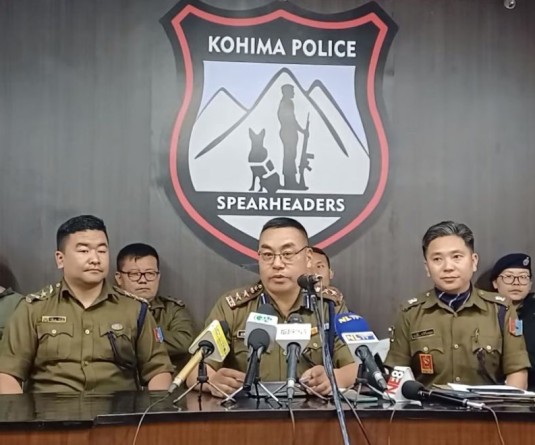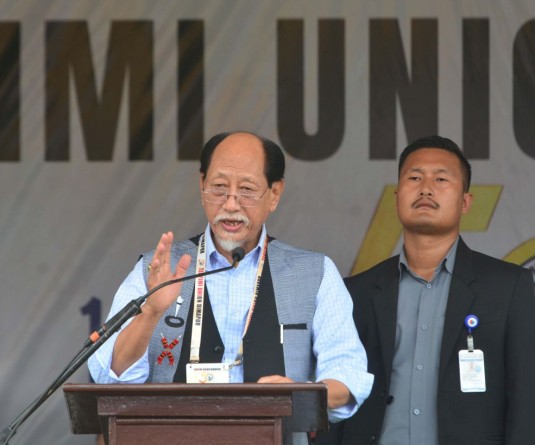
The 9th day of the Hornbill festival celebration at Kisama was hosted by Minister, Agriculture & Cooperation, G. Kaito Aye and Advisor, Social Welfare, HG & Civil Defence, Noke. The chief guest was SM, General Officer Commanding 3 Corps, Lt. General, Gopal. R. AVSM.
The cultural extravaganza began with the Chang cultural troupe of Noksen village enacting ‘‘Koku Jambü’’- declaration of winter season feast. This was followed by children folk dance performed by the Rengma Cultural Troupe. Chakhesang Cultural Troupe demonstrated ‘‘Chüse Ketsü’’- mass cursing. Traditionally, all villagers from upper and lower khel would gather at the public meeting place and curse those indulging in illegal activities like witchcraft, robbery, land encroachment, rape, murder etc.
The Yimchunger team performed a folk tune called Sangkung Thokhi Khündangusing a bamboo mouth organ (Jews harp). The Phom troupe demonstrated Vangnyukpu, a ritual which is carried out to relief the land of and its dwellers from drought. The Kuki troupe from Phangjang village performed a dance called Sagol Kengkhai which is patterned on the movement of group of wild pigs. This dance is performed with the blowing of Theipit (wind instruments), drums and gongs.
The Konyak cultural troupe demonstrated Phoa Angoi Bu Tsai, top spinning game. This game is played when an old field is abandoned for a new one, singing songs to the old field. The Ao cultural troupe demonstrated a dance which is an imitation of the fight between two cockerels. A folk song called Luyu Thsak Khi was performed by the Sangtam cultural troupe. The Khiamnuingan cultural troupe performed Shangleh, a folk song sung during festive gatherings. The Garo cultural troupe demonstrated and indigenous game called Wapong kala which is played between two contending parties (two participants only) who sit facing each other while grasping a bamboo pole. The Kachari cultural troupe performed a traditional dance called Bai Bin or Suphen, which is performed during post harvest festival of Bishu. The Pochury troupe performed Ha Hye, a dance displayed during the feast of merit which enhances the prestige and social status of the host.
The Lotha troupe demonstrated Omi Elha- traditional fire making. The Angami troupe performed a musical number on Tati/Lubo, a stringed instrument. The Zeliang cultural troupe performed Chingda Be Lim, a courtship dance which is usually performed by young unmarried boys and girls of the village seeking prospective life partners. The Sumi cultural troupe performed a folk song called Le Jo Le, which tells the story of their rich cultural heritage passed down through generations.
The afternoon cultural extravaganza was hosted by Minister, Soil & Water Conservation, Women and Child Development, Kashiho Sangtam and Advisor, IP&R, SCERT, Village Guard, Toshi Wungtung. General Manager, North East Frontier Railway Construction, N.K Prasad was also present during the festival.
(DIPR)





